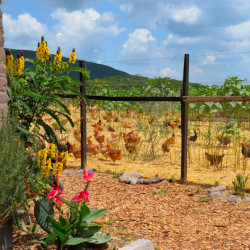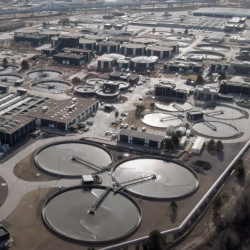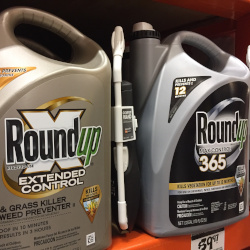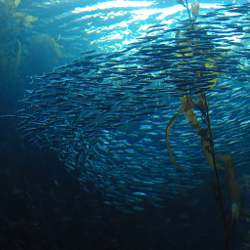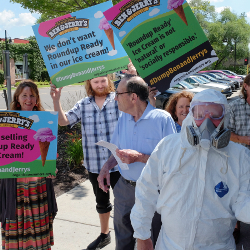Ben & Jerry’s talks the talk about getting money out of politics.
But make no mistake—the glyphosate we found in Ben & Jerry’s ice cream is in there because Monsanto has spent Big Money to bury the truth about its cancer-causing Roundup weedkiller.
It’s not just Monsanto that profits from Roundup sales. Ben & Jerry’s, owned by transnational consumer products conglomerate Unilever, profits, too. By sourcing milk from the industrial factory farm dairy industry, which feeds its cows glyphosate-drenched Roundup-Ready crops, Ben & Jerry’s admittedly “maximizes” profits.
As we wrote last week, it’s a lucky coincidence that we discovered weedkiller residues in Ben & Jerry’s ice cream just as court documents revealing the extent to which Monsanto has lied about the safety of Roundup are coming to light.
Unilever and Ben & Jerry’s know that 66 percent of consumers will pay more for, and remain loyal to products peddled by companies that say they’re committed to positive social and environmental impact.
But no way can Ben & Jerry’s support the company’s claim that it cares about the environment, much less social and economic justice or global warming, as long as it continues to profit by supporting an environmentally disastrous industrial dairy system, instead of Vermont’s organic dairy farmers.
Ben & Jerry’s has a real opportunity to make a real positive impact, instead of creating a phony perception.
We’re glad Ben & Jerry’s wants to get money out of politics. It’s time for the ice cream maker to also get glyphosate out of its ice cream—and out of our soil and waterways.
Today, we’re taking that argument to the streets.
Read our press release
TAKE ACTION: Tell Ben & Jerry’s CEO Jostein Solheim (aka Scooper Man): Roundup-Ready Ice Cream is not ‘socially responsible.’ Go Organic!
Text ‘dirtydairy’ to 97779 to sign the petition
Sign up to organize a Ben & Jerry’s protest and media event in your community
Call Ben & Jerry’s (802-846-1500) and ask the company to go organic
Post on Ben & Jerry’s Facebook page
Click to tweet this message to Ben & Jerry’s










